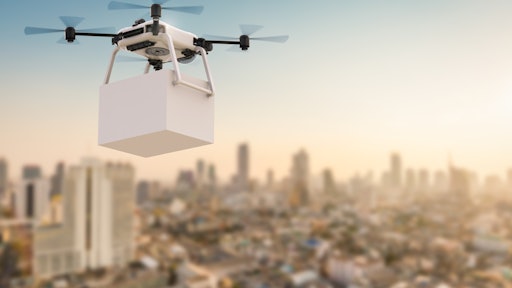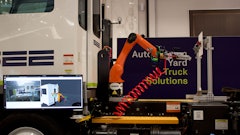
The future of logistics quickly packs, ships and transports goods straight to your door — without human interaction.
Imagine a world with safer roads, less traffic congestion, reduced carbon emissions and increased productivity — all resulting from advanced logistics solutions. With autonomous vehicles and drones increasingly handling shipping and logistics operations worldwide, our technologically driven future will see remarkable efficiency, safety and sustainability improvements.
Despite the undeniable promise of this streamlined future of logistics, we’re not there yet. Between increased demand for consumer goods, a depleted workforce, dependability issues with legacy carriers and two-plus years of shipping congestion, delivery disruptions and component shortages, calls for this technological transformation to combat the strained global supply chain’s growing “reliability hangover” are intensifying into a fever pitch.
With autonomous technologies continuing their rapid growth across the shipping and logistics space, organizations industrywide are seeking more ways to optimize their operations and stay ahead of the competition — especially in first- and last-mile delivery. One of the most effective ways to maximize the logistics sector in the face of myriad challenges and disruptive transformation is leveraging custom software solutions that can help streamline shipping logistics operations, improve efficiencies and reduce costs.
Inadequacies with Legacy Carriers
Although legacy carriers like UPS, FedEx and DHL have dominated as serious players in the logistics industry for years, these massive companies also face several shortcomings in the modern world of logistics.
First and foremost, legacy carriers are no longer fast enough to meet the demands of the 2023 consumer market — particularly in expedited and perishable deliveries. From infrastructure limitations and complex processes that lead to delays and inefficiencies to stiff competition from a wide range of players, including e-commerce giants like Amazon and smaller, more agile startups, legacy players have struggled to keep pace when it comes to first- and last-mile delivery due to a range of factors.
Traditional carriers tend to have rigid systems and complex processes, making adapting to evolving customer needs or transformative new technologies to stay competitive in a rapidly changing market difficult. This limited flexibility can slow down first- and last-mile delivery, further complicating logistics industry challenges.
Worse yet, these players often have limited visibility into the entire supply chain, including the first and last mile. Without these insights, legacy carriers struggle to identify and address potential problems, leading to delays and other issues that negatively impact customer satisfaction.
Last-mile delivery and other value-added services typically come with exorbitant costs that open the door for newer, more nimble players in different markets that can offer lower prices. In some cases, legacy carriers may be limited by their existing infrastructure, specifically regarding last-mile delivery in urban or particularly rural areas, which makes offering fast and efficient delivery options onerous — and strikingly so in markets with high population density.
To remain competitive, legacy carriers are shifting their focus to improving visibility, simplifying processes, reducing costs and investing in new technologies that enable faster and more efficient delivery options.
Autonomy: A Trend in the Future of Logistics
A world in which autonomous technologies completely streamline shipping and logistics operations holds incredible promise. And companies across industries recognize the advantages of autonomy in the logistics sector.
A vanguard in the modern delivery space, Amazon, for example, almost immediately recognized that its e-commerce wing could not depend on current options to meet evolving consumer demands for immediacy and convenience, developing the proprietary Amazon Logistics model that exemplifies the value of futuristic next-day and last-mile delivery services. By unifying its logistics operations, the tech giant now offers a customized solution that meets customers' needs by remaining one step ahead of legacy carriers.
As technology advances, custom software solutions are paramount for logistics companies looking to stay competitive in a rapidly changing industry, helping businesses of all sizes manage their shipping needs more effectively.
Custom Software Aligns Autonomy to Streamline Shipping
With autonomous technologies increasing in popularity and deployment across industries, customized software solutions empower logistics companies to operate on a larger scale and improve how they manage expedited shipping services.
From real-time visibility to automation and customization, custom software solutions offer benefits that can help companies streamline their operations and meet the evolving needs of their customers.
One of the key benefits of custom software solutions is real-time visibility. By providing insight across the entire supply chain, unique logistics software platforms enable companies to identify potential problems earlier on and respond rapidly to ameliorate concerns. The visibility custom software solutions unlock can help reduce delays and improve overall customer satisfaction.
Even better, custom software solutions can help optimize shipping routes, reduce transit times and improve the efficiency at each link in the logistical chain. Using data analytics and machine learning algorithms, forward-thinking software platforms can identify the most efficient routes and provide real-time updates to drivers and other stakeholders, helping reduce costs and improve the end-to-end customer experience.
Unifying automated technologies — whether tracking shipments, managing inventory, processing returns or otherwise managing the delivery process — custom software solutions can harness artificial intelligence and machine learning to analyze data from disparate sources to identify potential bottlenecks and improve overall logistics performance. By integrating with autonomous vehicles, leveraging AI and machine learning, streamlining warehouse management, enhancing last-mile delivery and providing customer insights, customized software can help companies better power their deliveries.
The Future is Now
Now, envision a straightforward solution that connects manufacturers, drivers, tracking services and the customer experience from end to end. With custom software, drivers use their app to scan packages into the system, consolidate different packages by destination and assure cargo plane loadmasters they have all the correct packets and parcels. Loadmasters can confirm on their end and ping consolidation drivers to distribute packages to multiple last-mile delivery drivers, who can verify delivery of the appropriate time-sensitive packages to the correct correspondent destination addresses. Custom software ensures this futuristic view of logistics will soon become our reality.
Software solutions can be customized to meet each company's unique needs and enable greater flexibility and scalability, helping companies across industries adapt quickly to changing market conditions and customer demands. By helping supply chain professionals streamline and improve their shipping logistics operations, custom software solutions are transforming how goods are transported to customers around the globe — for the better.


























